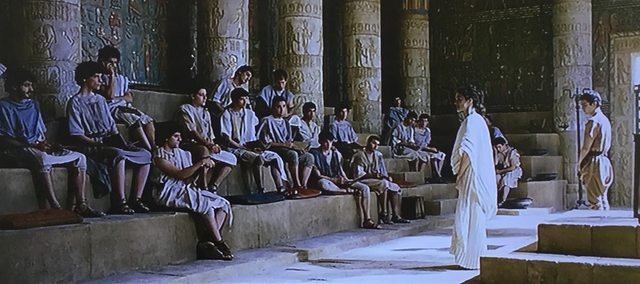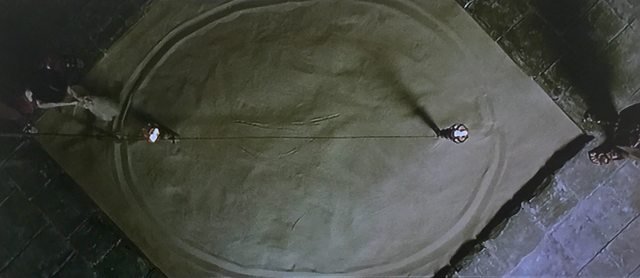If i could be granted one wish to go back in time, one place would be very high on my list. The Library in Alexandria. This was the center of knowledge and learning in the ancient world for many centuries and when it was destroyed, much of recorded philosophy and science went with it. According to records, this may have happened over several centuries, but a key point is obviously, when the Christians overtook the city in late fourth century, and destroyed all "pagan" temples. At this time a roman, female natural philosopher, called Hypatia, lived in Alexandria and did lectures in the library. If nothing else, a visualization of the great library is a fetish of mine, that easily justifies watching this movie.

Her story is the thread through the movie, but it is a lot more than that. It gives a fairly accurate description of the religious and political cauldron this city was at that time. The romans had the military power. There were the ancient Greco-Egyptian conglomerate of gods, the Jewish and their old beliefs and then there were the new kids on the block, the Christians, who followed the teachings of the (relatively new) man god Jesus Christ. Add to that the center of philosophical learning around the library, which in the face of the other beliefs, was considered as atheist as could be. There are some fairly uninteresting love stories woven into the tale of Hypatia. Little is known about the real person, so most of this is pure fiction and works mostly to give it a female interest angle. Actually so little is known about her that the main reason she is dragged to the forefront, is just the fact that she was a woman among a long line of male philosophers, more than her philosophy. Here she is given the (re-)discovery of the heliocentric system and the elliptical orbit of planets, which i think is wishful thinking. It is artistic liberty, to give the viewer a chance to be in the shoes of an ancient philosopher.

For this type of historical film i did not expect much character development, but still it manages to convey the situation believably and keep the characters interesting. I think Weisz does a fine job with Hypatia, but also Isaac makes a believable character, one of the two that is in love with her, the other being one of her slaves, who turns against her. The most important lesson i got from this movie though, was actually very enriching. I have a bit of a philosophical streak and what i realized was, that the philosophers of the ancient world failed so miserably at their job. They lived in a world of learning for the sake of learning. A proto-version of our academia-arrogance, where it is all about sucking funds out of the rulers, instead of working among the ordinary people in society on a market basis. While they sit in their temple of learning, pondering about whether the earth moves this or that way, ordinary people live in poverty or even as slaves. The moral aspect of philosophy was so unforgivably ignored by the ancients, that i believe this is what ultimately destroyed it .. and the library and Hypatia with it.

For a person with an interest in ancient history and philosophy this is a surprisingly good movie, that gives a very unbiased view of the whole situation. One might suspect later writers in the christian middle ages, to downplay the level of responsibility of the Christians, in the destruction of the old world by using violence, but here the director has no problems giving the christians a savage image that, i believe, is closer to the truth. Christianity was the first religion for the undertrotten and the slaves. And since the politicians and the philosophers of old, had not dealt with the problem of slavery, they would ultimately die by the sword of those they oppressed. A solid and recommendable movie.

Rating: 7/10